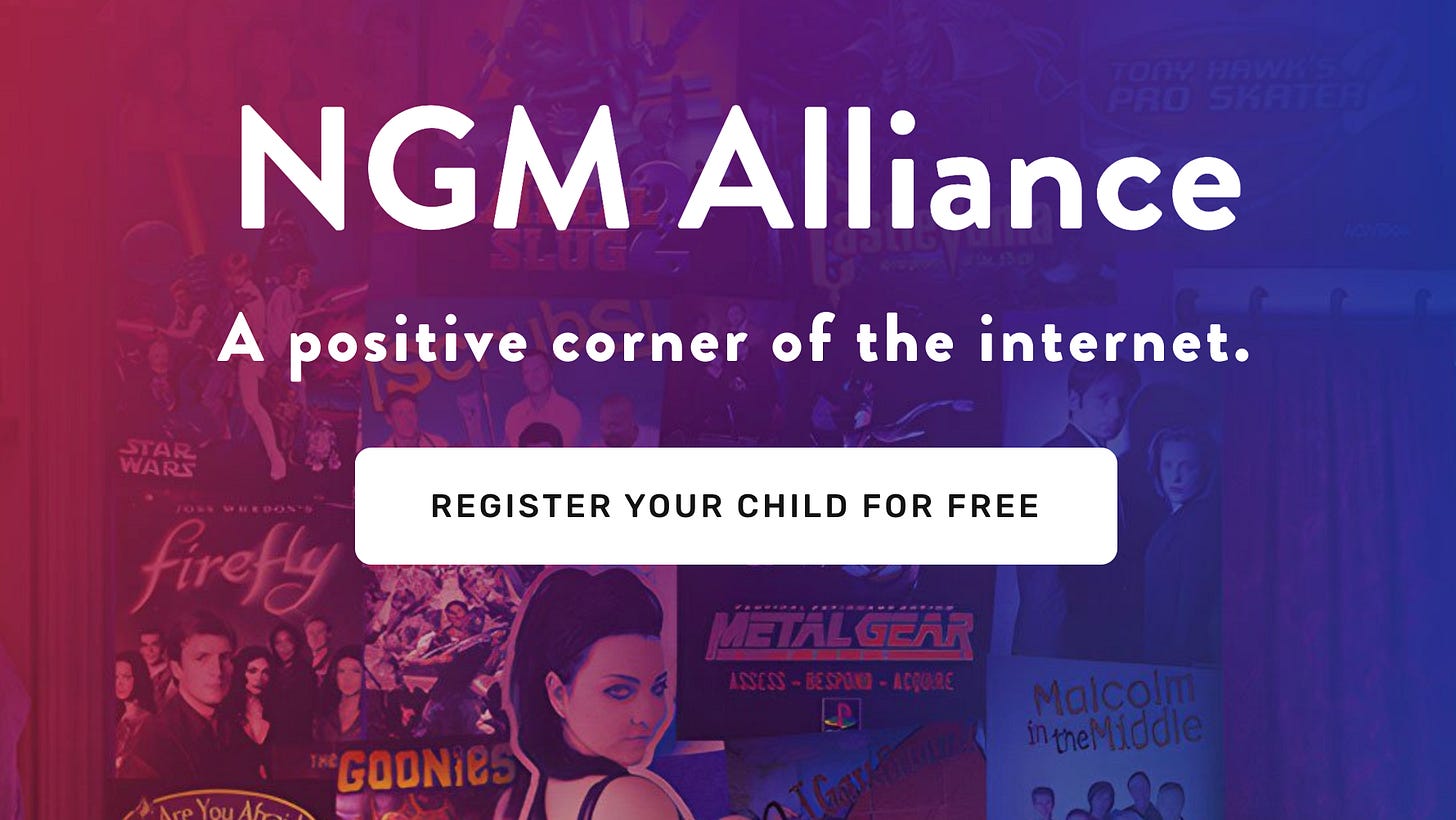Don't Give Up On Young Men
Next Gen Men started a Discord server to give teenage boys a safe and supportive online home. Here's what they learned in the process.
On Wednesday, as we all learned that Donald Trump had been elected to another presidential term, the first email I opened was from a reporter, wondering how this news might affect my work with boys and young men.
I understood where the request was coming from - there have been a lot of stories about the growing gender divide in politics, and lots of think pieces about how different portrayals of masculinity were used by the campaigns.
The Trump campaign made a concerted effort to reach young men through "The Manosphere". For some adults, seeing these efforts may have been the first time they realized how much sway online influencers, YouTubers, and podcasters have over young men today.
I was reminded of the first time I talked to a reporter about raising boys in the age of Trump, way back in 2016. It was right after the release of the The Access Hollywood video, where Trump bragged that “When you’re a star, they let you do it. You can do anything. Grab ’em by the pu**y. You can do anything.”
When that tape came out, it was big news, and I knew my 14-year-old son would probably hear about it through friends or jokes on Saturday Night Live.
I didn’t want it to be dismissed as "locker-room talk," so it seemed important to make my views clear right away. I texted my son an article about the incident and said:
“Remember that grabbing others—especially their breasts, butts or genitals—without consent is NEVER OK, and if you see someone doing that you should try to intervene.”
That was a long time ago - that son is a fully grown 22-year-old man now - but conversations like this are still important, and may feel more pressing now that Trump is headed back into office.
What messages does it send to boys when they see that someone can be brag about - and be found guilty of - sexual assault and still get elected president?
I am hopeful that this election will get more people thinking about the conversations we need to be having with the boys in our homes and our schools, and how we can encourage empathy, emotional expression and critical thinking.
Today, I’m sharing a new report from one of my favorite organizations, Next Gen Men. This small-but-mighty Canadian nonprofit has been doing innovative work with boys for 10 years. They have created an active online space where boys’ mental wellness, peer support, and anti-bullying efforts are prioritized.
It’s the kind of program I think we might need more of right now.
Big love,
Christopher
Bring Boys Together For Support - On Discord
Next Gen Men does a lot of cool things, but one of most innovative is is hosting the NGM Alliance on Discord, “a safe online space for masculine-identifying youth in Grades 7-9 to build connections with like-minded peers.”
NGM Alliance is an online space, but it prioritizes relationships. “It’s a place where real connections are made, and where youth feel truly known and understood on a deeper level.”
Next Gen Men just released a report summarizing what they’ve learned from the boys in the group. The findings provide a lot of insight into the lives of boys today and may inspire some thoughts about how you could better connect with the boys in your life.
Why Boys Spend Time Online
This is something boys are thinking about themselves—seven in ten boys (71%) said they were “a little bit” or “moderately” concerned about spending too much time online.
Watching videos, TV and movies (80%), chatting with friends and family (75%), and video gaming (68%) were clearly identified as the most common things that boys do online.
Porn (2%) was rarely identified as one of the most common ways boys spend their free time online.
Boys identified social connection (36%) as the most positive way the internet had impacted their lives, above entertainment (18%) and access to information (18%).
In comparison, boys identified social challenges (34%) as the most negative way the internet had impacted their lives, followed by feeling like they wasted too much time online (30%) and struggling with mental health and self-esteem (25%).
How the Internet Perpetuates the Man Box
The largest source of stress in boys’ lives was school (56%), followed by high expectations and pressure (28%), social interactions (26%), friends (21%) and issues related to masculinity (15%).
Two in three boys (61%) felt overwhelmed, stressed out, or not themselves on a regular (daily or weekly) basis. Almost all of them (93%) had felt that way within the past month.
One in ten boys (11%) agreed that guys should handle personal problems by themselves.
Four in five boys (89%) felt like they had someone they could trust to talk with when going through a tough time or struggling with mental health.
Very few boys (16%) sought help on a regular (daily or weekly) basis. Twice as many (30%) said they had never once looked for mental health support.
Two in three boys (68%) said they mostly relied on themselves.
The majority of boys (52%) had experienced thoughts of suicide at least once. One in three boys (34%) were struggling with thoughts of suicide at least once a month.
Confidence And Physical Attractiveness
One in four boys (23%) agreed that being strong or acting tough are important qualities for guys. Roughly the same number of boys (22%) agreed that it is important for guys to be physically attractive.
Three in four boys (72%) had experienced or witnessed cyberbullying.
One in three boys (30%) said that social media had negatively impacted their body image.
Bullying was identified as one of the most negative impacts (14%) that the internet had on boys’ lives, followed by self-esteem (9%).
Homophobia and Hypersexuality
Roughly one in ten boys (7%) agreed that it is important for guys to not act or appear girly or gay.
Roughly one in ten boys (13%) agreed that it is important for guys to be able to get girls.
One in three boys (36%) said that the people they talk to online regularly make homophobic comments.
Two in five boys (41%) said they learned most of what they know about sex online.
What Else Has Next Gen Men Learned?
There’s a lot of reflections in this report, and I encourage you to read the whole thing. This paragraph from the conclusion particularly stood out for me:
“Boys are capable of pushing the feminist movement for gender justice towards a new horizon. Many of them haven’t yet made up their minds about what that really means for them as men. And while we can’t give them the answers, we can give them the tools. In redefining the adage ‘boys will be boys,’ we’ve found ourselves contemplating the kinds of young men they will ultimately grow into. The answer, of course, is that boys will be whatever we give them the space and support to be.”
Want More? Check Out the the Momentum Summit
If you’d like to learn more about Next Gen Men’s Work, sign up for their newsletter or, even better, head to their Momentum Summit in Calgary on Nov. 14th.
Recent Teen Health Today Highlights
Celebrating The AMAZING First Year Of Teen Health Today
Teen Health Today started a year ago. Let's look back at 16 stand-out articles.
How To Get Teens Talking About Gender Roles and Gender Equity
Learn about a fantastic (and free!) new program that encourages teens to think critically about restrictive gender expectations.
How To Talk To Teens About Suicide
Learn new ways to address this challenging subject.
How To Talk To Kids About P-O-R-N
Open, shame-free conversations can help families feel more connected
If you enjoyed this post, please consider forwarding it to someone who might like it, and click the ❤️ or 🔁 button so more people can discover it on Substack. Thank you!











This question - “What messages does it send to boys when they see that someone can be brag about - and be found guilty of - sexual assault and still get elected president?” -- is the one that's been going 'round & 'round in my head. (As well as its corollaries: What does it mean for girls? For women? For our society & country?) My boys are about the same age as yours. Like you, I remember that Access Hollywood recording coming out & being compelled to talk w my boys. I remember being frustrated & disgusted; there I was, a parent of 4 young boys, trying to teach them that such behavior and talk is NOT OKAY, while a presidential candidate does it. Well, we now know how that turned out. Despite that tape, he was elected president. Despite that tape, and the convictions, and the consistent, persistent sexism and racism, he was elected again; over a female, again. And as much as I did talk w my boys about what I consider appropriate, respectful behavior - and did my best to model such -- they grew up in a society that normalizes, celebrates, and rewards the opposite.
I am not really sure how to respond to this. Insm the mother of a daughter, not a son, so I guess I have a different perspective. I don’t see any discussion about how boys need to grow up to respect women, care about their health and bodies, think of them as equal citizens in the world. Right now, boys have learned that women come second behind men’s desire for wealth and power. That if they stand up to men, they get insulted and bullied. It is hard for me to feel bad for boys right now